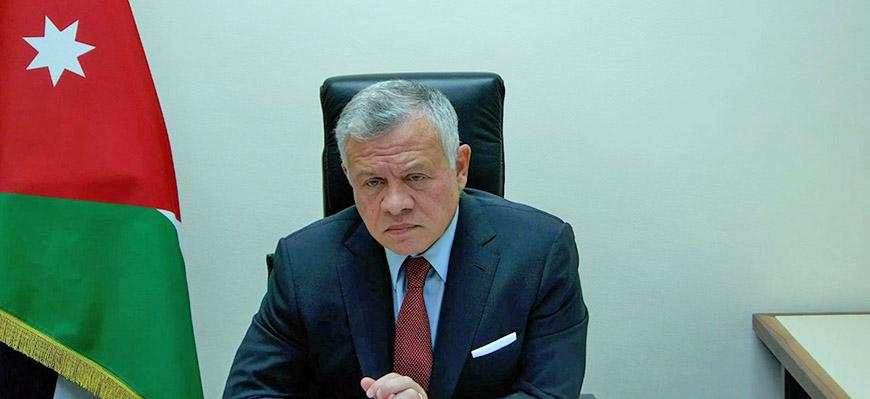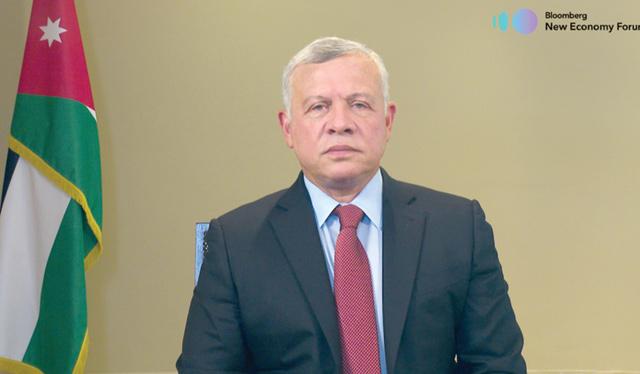You are here
King delivers special address at WEF Davos Agenda
By JT - Jan 28,2021 - Last updated at Jan 28,2021

His Majesty King Abdullah delivers a special address at the World Economic Forum’s Davos Agenda meeting on Thursday (Photo courtesy of Royal Court)
AMMAN — His Majesty King Abdullah on Thursday participated in the World Economic Forum’s Davos Agenda meeting, held under the theme “a crucial year to rebuild trust”.
The Davos Agenda meeting is held virtually with the participation of a number of heads of state and government, representatives from international organisations, government officials, leading business executives, and academic and economic experts from more than 70 countries, according to a Royal Court statement.
King Abdullah delivered a special address, followed by a Q&A session hosted by WEF Founder and Executive Chairman Professor Klaus Schwab.
Following is the full text of His Majesty’s remarks:
“In the name of God, the Compassionate, the Merciful,
My dear friends:
It is a pleasure to join your insightful discussions, and I thank my friend Professor Schwab, for inviting me to be part of this very important meeting.
We begin a new year with many of the challenges that marked the last one still rippling into just about every sector. The pandemic continues to ravage our world, and we have barely scratched the surface of its long-term humanitarian and economic implications.
Yet, I believe there is a glimmer of hope. Some vaccines are ready, and as we start this long, overdue healing process, we are better served trying to heal this together.
And here we must ensure the efficient and equitable distribution of COVID vaccines as well as treatments. It is a moral duty to treat the vaccine, as a global public good that ensures that low-income and poor countries are not left at the end of the waiting line, as high-income countries buy the majority of the most promising vaccines.
Amidst these challenging times, safeguarding the health and wellbeing of refugees remains a global responsibility. And as Professor Schwab said, as host of the second highest number of refugees per capita globally, Jordan continues to protect refugees in its pandemic response, and we are among the first countries in the world to start vaccinating refugees for free. But international support is also essential. We must collectively work to develop new policy tools to help us address the problems of today and tomorrow.
In Jordan, we have been able to double the rate of financial inclusion over the past six years, by relying on digital approaches to increase access to finance for Jordanians and refugees alike. And mobile money account ownership increased, as we sought innovative solutions to support workers’ families in need.
Our global priorities must also include improving access to education, and reducing the digital divide, while preparing the labour force for the jobs of tomorrow — which are quickly becoming the jobs of today.
So investing in SMEs, the backbone of growing economies, is a must to expedite recovery. As part of our pandemic response, Jordan enabled nearly 13,000 SMEs to move from the informal to the formal economy, and we are one of the top global reformers in the Ease of Doing Business report in 2020. Our economy is ready to recover, but in collaboration with the private sector.
My friends,
As we work to heal together, we must use the clarity afforded to us in adversity, to move confidently into a brighter future together.
The pandemic has painfully proven to us that returning to business as usual is neither sustainable nor effective. And so let us rethink and re-invent those ever-present terms of globalisation, multilateralism and international community. Let us put equality, inclusivity, and dignity at the heart of what they stand for.
Our world needs a re-globalisation that seeks a sustainable, equitable and green recovery, that puts the wellbeing of our peoples and our planet first.
We need to put the emphasis on community, in international community, to focus on the shared values, aspirations and ideals that unite us.
We need to turn multilateral trade into a tool for peace and shared prosperity, by increasing the resilience of supply chains, and fostering the integration of developing countries, to promote inclusive growth.
And we all need to rethink the way we deal with our planet. COVID has been a harsh reminder that what we do to nature has dangerous consequences. Let that lesson teach us not to ignore the greater pandemic of climate change.
This, I believe, is an urgent crisis that we must address together, through creative solutions that prioritise green investments and renewable energy. As one of the world’s water poorest countries in the world, Jordan is acutely aware of the threat of climate change. We plan for our recovery to be rooted in green development and infrastructure projects.
And our attention to climate change is also key, as we work to counter the global threat of food insecurity, which has become even graver, in the wake of the COVID pandemic, with millions of people at the threat of starvation.
So we must work collectively to promote the adoption of sustainable agri-tech solutions that improve the resilience of global food systems, to ensure accessibility, affordability, and quality, while protecting our environment.
So my friends,
This pandemic has made us all equal. And let that be one of the positive lessons we take from this difficult time, as we look ahead.
Let our empathy drive our progress and recovery, as we build bridges to allow the better exchange of not only vital supplies and expertise, but also the exchange of hope and positive ideas.
I hope that we let our humanity lead the way.
Thank you very much, Professor Schwab.”
Responding to questions from Schwab during the Q&A session, His Majesty reiterated warnings against global food shortages in the post-pandemic phase.
The King stressed the importance of communication between countries to share global resources, noting that crises, such as the COVID-19 pandemic, transcend borders and impact the rich and the poor alike, which calls for moving away from politics to practicality.
Turning to the centennial of the Jordanian state, His Majesty praised the achievements of Jordanians over the past 100 years, which bolstered the state’s strength and resilience and helped transform challenges into opportunities despite regional and international upheavals, expressing optimism in the capability of Jordanian youth in advancing the state during the second centennial.
Noting that Jordan always punches above its weight, and believes in doing the right thing, the King said: “I think sometimes, Jordan is taken for granted for a lot of the things that we do, because everybody knows that Jordan will always do the right thing, but that allows us, I think, a stronger voice in the international community, because we are true to our word; we stick to what we say and what we try to do to help people beyond ourselves.”
Speaking at the start of the special session, Schwab praised Jordan’s efforts, under His Majesty’s leadership, in bolstering stability amidst regional turmoil, which turned the Kingdom into the “interlocutor of choice”.
He noted that Jordan’s effective handling of the COVID-19 pandemic is testament to the country’s effective institutions, commending the Kingdom’s support for refugees, especially in light of the repercussions of the pandemic.
The Davos Agenda meeting, which opened on January 25 and concludes on Friday, aim to mobilise international partnerships to counter the humanitarian and economic impacts of the COVID-19 pandemic by seeking innovative solutions for future recovery and prosperity, and advancing and accelerating public-private collaboration on critical global issues such as COVID-19 vaccination, job creation, and climate change.
Related Articles
AMMAN — His Majesty King Abdullah is scheduled to participate in the World Economic Forum’s Davos Agenda meetings held virtually between Jan
AMMAN — His Majesty King Abdullah on Monday participated in the Bloomberg New Economy Forum, which focused this year on bolstering internati
AMMAN — Hope and help are in short supply when it comes to the refugee crisis and the situation of host countries, Her Majesty Queen Rania s













